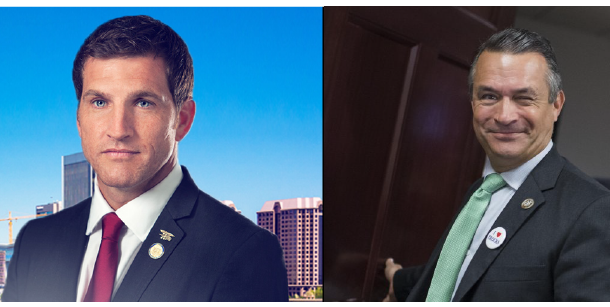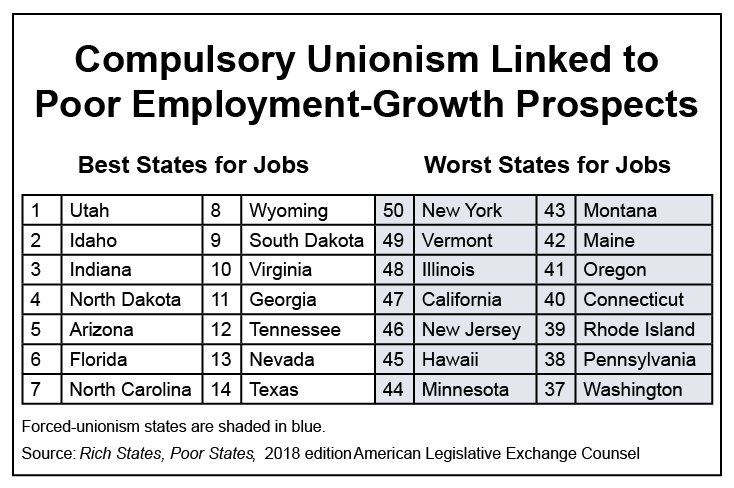Is This Any Way to Run a City’s Schools?
Leaked CTU Proposals Won’t Do Anything to Improve Schools’ Poor Performance

Politicians Urged to Get Off the Fence
Constituents’ Message: Keep Pro-Right to Work Campaign Promises
A little more than a year and a half ago, 22 candidates were elected to Congress for the first time after pledging, in response to the National Right to Work Committee’s Survey 2016, to sponsor or cosponsor legislation abolishing federally imposed forced union dues and fees.
And the vast majority of the U.S. House members who promised to support forced-dues repeal are now cosponsors of H.R.785, the National Right to Work Act.
But a relative handful of the representatives who answered their Committee surveys 100% in favor of Right to Work, such as U.S. Reps. Scott Taylor (R-Va.), and Don Bacon (R-Neb.), have yet to follow through by cosponsoring forced-dues repeal.
This summer, the Committee is mobilizing members and supporters in several targeted congressional districts and states to convince fence-sitting politicians to cosponsor H.R.785 or its Senate companion measure, S.545.
Constituents of Taylor and Bacon Are Strongly Pro-Right to Work
Later this year, the Committee mobilization will be geared primarily at persuading Big Labor politicians to change course and stop supporting compulsory unionism.
Throughout the course of Survey 2018, candidates will be given several chances to return their surveys and answer 100% in favor of American employees’ Right to Work.
National Right to Work President Mark Mix commented:
“This year, as in previous election years, millions of grassroots Right to Work supporters are being enlisted to lobby federal politicians seeking election or reelection to oppose compulsory unionism across the board.
“ Scott Taylor, Don Bacon, and other U.S. representatives who are currently being targeted through the Survey Program represent some of the most strongly pro-Right to Work jurisdictions in America.
“There’s no sensible reason why House members whose constituencies are overwhelmingly and passionately opposed to monopolistic unionism should hesitate to cosponsor H.R.785.”
No One Should ‘Be Required To Join’ Any Private Group ‘Against His Will’

Of course, it isn’t just in a subset of congressional districts that public opinion strongly supports the Right to Work principle.
“Poll after poll shows that the American people as a whole recognize that compulsory unionism is wrong,” said Mr. Mix. To illustrate the point, he cited an August 2014 nationwide scientific survey of adults aged 18 and over conducted by Gallup, Inc.
The poll found that 82% of adults agree that “no American should be required to join any private organization, like a labor union, against his will.”
“Unfortunately,” observed Mr. Mix, “federal labor policy has long been in conflict with the common-sense views of the vast majority of ordinary citizens across the country.
“For more than eight decades, it has explicitly authorized the termination of employees for refusal to join or pay dues or fees to a union, even if they don’t want it, and never asked for it.”
But all this would change if H.R.785/S.545 became law. This legislation would simply repeal the current provisions in the federal code that authorize and promote the termination of employees for refusal to pay money to an unwanted union.
Top 14 States For ‘Economic Outlook’ All Have Right to Work Laws
In addition to enjoying the support of the clear majority of Americans, federal Right to Work legislation is almost certain to foster faster job and income growth around the country, based on decades of experience at the state level.
Rich States, Poor States, a survey of state economic policies, past performance and prospects prepared by Arthur Laffer, Stephen Moore, and Jonathan Williams, and published by the Arlington, Va.-based American Legislative Exchange Council, helps show why this is so.
The Laffer-Moore-Williams analysis highlights an “economic outlook ranking,” a forecast of economic performance “based on a state’s current standing in 15 state policy variables” related to taxes, spending, and business regulation as well as labor-management relations.
And, according to the 11th edition of Rich States, Poor States, published this April, every single one of the 14 top-ranking states for economic outlook has a Right to Work law. Not a single one of the 17 bottom-ranking states for economic outlook protects employees from compulsory unionism.
Right to Work has a much greater influence on a state’s overall climate for job and income growth than one might expect.
This is partly because, wherever Big Labor is endowed with forced-dues privileges, it funnels a substantial share of the loot extracted from workers into efforts to elect and reelect politicians who support higher taxes, more government spending, and strait-jacket regulation of business.
As Rich States, Poor States shows, all of these union boss-favored public policies are negatively correlated with job and income growth and economic health.
Ideal Is For All Candidates to Oppose Forced Unionism
And while the detrimental impact of forced dues-funded politicians is greatest in Big Labor-dominated states, employees nationwide lose economic opportunities because of the actions of union-label U.S. congressmen and senators.
Mr. Mix concluded: “Americans find the very idea of compulsory unionism distasteful.”
“And it has been a disaster in practice. The ideal, therefore, would be for all federal candidates to vow to oppose it in the future, regardless of what their records have been up to now.”
All major-party candidates as well as key significant third-party and independent candidates in every House and Senate race are asked to participate in the Right to Work Survey Program.
And pro-Right to Work citizens in every House district and every state where there’s a Senate race are contacted and requested to help turn up the pressure on their candidates to respond to their surveys.
“Of course,” said Mr. Mix, “the Committee reserves the vast majority of its resources and mobilizes far more freedom-loving activists for House and Senate races that are at least potentially close and in which at least one candidate has taken a strong stand in favor of Right to Work.
“At the very least, Right to Work members and supporters want one candidate in each race this November to be a credible opponent of Big Labor’s monopoly privileges.
“In cases where only one of the two principal general-election candidates stands up for the Right to Work, the Committee’s job will be to let concerned citizens know about the contrasting positions of their candidates on the forced-unionism issue.
“I’m confident that, if there is a choice between a strongly pro-Right to Work candidate and a compulsory unionism candidate, the pro-Right to Work candidate is in a better position to gain public support.”

Leaked CTU Proposals Won’t Do Anything to Improve Schools’ Poor Performance

Wherever Big Labor wields the power to collect forced union dues, union bosses funnel a large share of the confiscated money into efforts to elect and reelect business-bashing politicians. Employment growth tends to lag as a consequence.

Members Insist They Keep Pro-Right to Work Campaign Promises